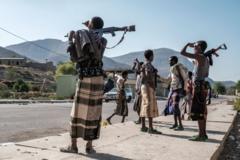Amid growing tensions, the Tigray People's Liberation Front (TPLF) has urged the African Union to mediate disputes after being stripped of its political status by the Ethiopian electoral board, which poses a serious threat to the 2022 peace agreement.
Tigray Party Warns of Peace Deal Threat Following Legal Ban

Tigray Party Warns of Peace Deal Threat Following Legal Ban
The Tigray People's Liberation Front claims its recent ban endangers the peace pact that concluded a two-year conflict in Ethiopia.
The Tigray People's Liberation Front (TPLF) is sounding alarms over a recent decision by Ethiopia's electoral board to revoke its political status, warning that this could jeopardize the peace deal reached in 2022 that finally ended a brutal two-year civil war. The ban, issued for failing to hold a necessary general assembly, has led to concerns about renewed violence in the already strained northern Tigray region.
In a recent statement, the TPLF deemed the electoral board's actions "dangerous," stressing that they threaten both the stability of Tigray, which the party governs, and the broader peace process initiated under the Pretoria agreement. This peace accord had established a tenuous truce after a conflict that left tens of thousands dead and millions displaced.
The decision to deregister the TPLF comes amid rising political unease in the region, coinciding with upcoming nationwide elections slated for June 2024. The TPLF, which had a dominant role in Ethiopian politics until Prime Minister Abiy Ahmed's rise to power in 2018, has faced internal divisions making it difficult to conduct elections and establish a united leadership.
The party responded to the ban by requesting the African Union exert pressure on the federal government to reconsider their decision. In a letter to the AU, they argued that the ban undermines the terms of the Pretoria agreement, which emphasizes mutual recognition of legitimacy between the federal government and the TPLF.
TPLF deputy chairman Ammanuel Assefa warned that the electoral board's decision could undermine the sacrifices made to achieve peace, stating, "This isn’t just about TPLF, but also about undermining what people have sacrificed." The ongoing delays in implementing key aspects of the peace deal, such as the resettlement of displaced people, have also added to worries that the situation could escalate back into violence.
International bodies including the United States, United Kingdom, and European Union have expressed concern over the deteriorating conditions, calling for urgent measures to prevent any return to the armed conflict that devastated the region.
In a recent statement, the TPLF deemed the electoral board's actions "dangerous," stressing that they threaten both the stability of Tigray, which the party governs, and the broader peace process initiated under the Pretoria agreement. This peace accord had established a tenuous truce after a conflict that left tens of thousands dead and millions displaced.
The decision to deregister the TPLF comes amid rising political unease in the region, coinciding with upcoming nationwide elections slated for June 2024. The TPLF, which had a dominant role in Ethiopian politics until Prime Minister Abiy Ahmed's rise to power in 2018, has faced internal divisions making it difficult to conduct elections and establish a united leadership.
The party responded to the ban by requesting the African Union exert pressure on the federal government to reconsider their decision. In a letter to the AU, they argued that the ban undermines the terms of the Pretoria agreement, which emphasizes mutual recognition of legitimacy between the federal government and the TPLF.
TPLF deputy chairman Ammanuel Assefa warned that the electoral board's decision could undermine the sacrifices made to achieve peace, stating, "This isn’t just about TPLF, but also about undermining what people have sacrificed." The ongoing delays in implementing key aspects of the peace deal, such as the resettlement of displaced people, have also added to worries that the situation could escalate back into violence.
International bodies including the United States, United Kingdom, and European Union have expressed concern over the deteriorating conditions, calling for urgent measures to prevent any return to the armed conflict that devastated the region.



















